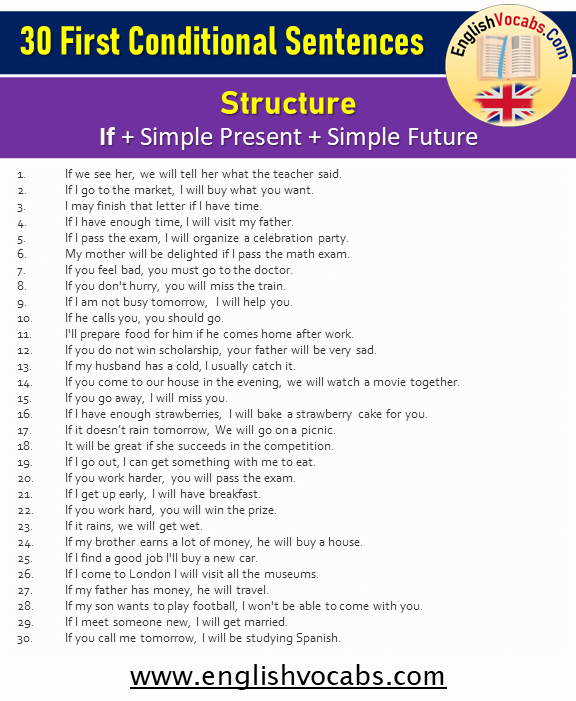20 First Conditional Sentences Examples, If Clauses Type 1

Table of Contents
Conditionals Type 1
Conditionals Type 1, also known as If Clause Type 1, is one of the frequently used sentence structures. The sentences formed in this structure express the situations that can happen or are expected to happen after a certain condition. The meaning in the sentence shows the event or situation that will most likely happen if a condition is met. As in all sentences containing “If”, for If Clause Type 1, there is a combination of two different sentences containing an “If” clause and the main clause. While there are separate rules for each type, the sentence structure rules for Conditionals Type 1 are as follows;
- The sentence structure using “if” should be Present Simple Tense, Present Continuous Tense, Present Perfect Tense, or Present Perfect Continuous Tense.
- The main sentence can be formed with Future Simple Tense (“will”) or words such as “Can”, “May”, “Might”, Could”, “Must”, “Should” and sometimes imperative sentences can be seen.
NOTE: Although there are the above details in the Conditionals Type 1 sentence structure, the most used structure is the Simple Present Tense of the “If” sentence and the other sentence, which is the main sentence, is formed with the “will” modal.
NOTE 2: If Clause Type 1 sentences are not sentences that give precise meaning. The meaning of the sentence describes the high possibilities or the probabilities that are expected to happen. The expectation of these possibilities after a condition reveals this grammatical issue.
Structure
If + Simple Present + Simple Future
What is Sentence?
Making sentences is the main aid of communication. Sentences indicate previous events or situations, continuous events and situations, instantaneous events and situations, and future events and situations. Sentences that are part of daily life contain subject and predicate. In addition, sentence elements such as an adjective, indirect compliment, and adverb can also be included. Different from this situation, sentences are named in 4 different ways in English. The names of this distinction are made as to the declarative sentence (statement), interrogative sentence (question), imperative sentence (command), exclamative sentence (exclamation).
1.If we see her, we will tell her what the teacher said.
2.If I go to the market, I will buy what you want.
3.I may finish that letter if I have time.
4.If I have enough time, I will visit my father.
5.If I pass the exam, I will organize a celebration party.
6.My mother will be delighted if I pass the math exam.
7.If you feel bad, you must go to the doctor.
8.If you don’t hurry, you will miss the train.
9.If I am not busy tomorrow, I will help you.
10.If he calls you, you should go.
11.I’ll prepare food for him if he comes home after work.
12.If you do not win scholarship, your father will be very sad.
13.If my husband has a cold, I usually catch it.
14.If you come to our house in the evening, we will watch a movie together.
15.If you go away, I will miss you.
16.If I have enough strawberries, I will bake a strawberry cake for you.
17.If it doesn’t rain tomorrow, We will go on a picnic.
18.It will be great if she succeeds in the competition.
19.If I go out, I can get something with me to eat.
20.If you work harder, you will pass the exam.


